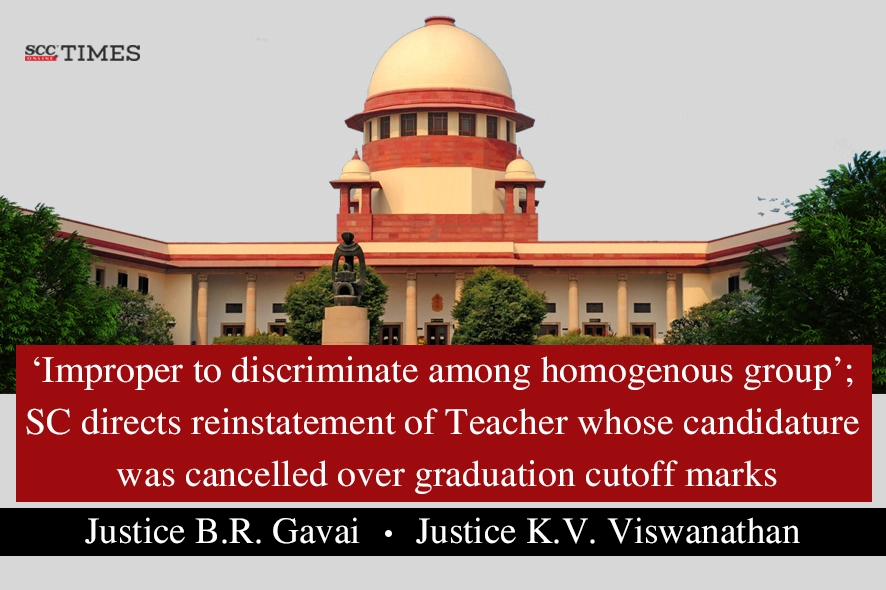Supreme Court: In a matter concerning the appointment for the post of Teacher, the division bench of BR Gavai and KV Viswanathan*, JJ. while setting aside the impugned order, directed the respondent-authorities to treat the appointment given to the appellant, pursuant to the interim order of the Division Bench dated 23-10-2021, as a regular appointment and after reinstating the appellant grant consequential benefits. Further, the Court clarified that except for the period the appellant actually worked, he shall not be entitled to any back wages.
In 2017, the authorities under the provisions of the Rajasthan Panchayati Raj Act, 1994 and the Rajasthan Panchayati Raj Rules, 1996, issued an advertisement inviting applications for the post of Teacher Grade III Level II in the Scheduled Area. A total of 1455 posts were advertised. The appellant applied for the post of Teacher under the said advertisement. One of minimum educational qualification for the appointment was Graduation with minimum 45% marks and one year Bachelor of Education (B.Ed) obtained in accordance with the National Council for Teacher Education (Recognition Norms and Procedure) Regulations.
The appellant had 44.58% marks in his graduation and was admitted to the B.Ed Course on 23-10-2009. The appellant, being from the reserved category, the qualifying percentage required for admission to the B.Ed Course was 40% marks in graduation (45% for general category). The appellant fulfilled this criterion and obtained admission. However, the appellant’s name did not appear in the provisional list of selected candidates, despite securing 44.58% marks, which was way above the cut-off marks.
The appellant contended that he was informed that his candidature was rejected for the reason that he had secured less than 45% marks in his graduation. Aggrieved, the appellant and another candidate (Rakesh Gaur) filed a writ petition, which were dismissed on 27-11-2018. Thereafter, theey filed appeals.
On 13-11-2019, concerning the appointment, the National Council for Teacher Education (NCTE) issued a clarification by way of a supplementary notification which stated that minimum percentage of marks in graduation shall not be applicable to those incumbents who had already taken admission to the Bachelor of Education or Bachelor of Elementary Education or equivalent course prior to 29-07-2011.
The appellant contended that since other candidates of the same batch group who got admitted to the B. Ed. Course before the cut-off date were granted appointment without requirement of securing minimum qualifying marks in the B. Ed. Course, therefore his case should be considered on a par with those candidates, and there should not be a discrimination amongst the homogenous class based on the cut-off date.
The Court noted that the NCTE notification was a sequel to the judgment in Neeraj Kumar Rai v. State of U.P., (2017) 14 SCC 608 wherein it was noticed that the 2009 Norms and Standards for Secondary Teacher Education Programme through Open and Distance Learning System leading to B.Ed. did not provide for any minimum percentage of marks in bachelor’s degree.
The Court further noted that by an order of 23-10-2021 relying on the NCTE notification of 13-11-2019, an interim order was passed directing the respondents to appoint the appellant on the post of Teacher Gade-III pursuant to the Advertisement No. 02 of 2017, if otherwise eligible. The appellant has, pursuant to the interim order was appointed. Thereafter, after the impugned order, the appellant’s appointment was cancelled on 07-06-2022.
The Court said that the appellant’s case was more akin to the case of Rakesh Gaur v The State of Rajasthan1 who had taken admission on 05-11-2009. Thus, the Court opined that on the special facts of this case that the Division Bench erred in applying the case of Dinesh Chandra Damor v State of Rajasthan2 instead of applying the reasoning in the judgment in State of Rajasthan v Ankul Singhal 3 and Rakesh Gaur (supra) to the facts of this case.
The Court said that it will be improper to discriminate inter se among a homogenous group of students admitted for the academic session 2009-10. As was pointed out therein, it could not be that those students admitted in the first round of counselling would be eligible, even with less than 50% marks in graduation, while the others admitted in the subsequent rounds of counselling would not be. It was on this reasoning that Rakesh Gaur (supra) was given relief. Thus, Rakesh Gaur (supra) was a case identically situated with the case of the appellant.
Thus, the Court while setting aside the impugned order, directed the respondent-authorities to treat the appointment given to the appellant, pursuant to the interim order of the Division Bench dated 23-10-2021, as a regular appointment and after reinstating the appellant grant consequential benefits.
CASE DETAILS
|
Citation: Appellants : Respondents : |
Advocates who appeared in this case For Petitioner(s): For Respondent(s): |
CORAM :
1. S.B. Civil Writ No. 14129 of 2018
2. D.B. Civil Special Appeal (Writ) No. 1205 of 2019
3. D.B. Special Appeal Writ No. 545 of 2020








